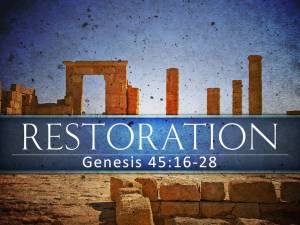What restoration doesn’t mean
 For 22 years Joseph had been in Egypt while his brothers lived daily with the lie they had propagated about his death. For that same time Joseph’s father believed him to be dead, and never stopped mourning for his son. You would have thought that such a restoration would be a great celebration. I’m sure it was, but it was not without its challenges. Don’t be caught off when you confront challenges in the restoration process. Here are three from the Joseph account.
For 22 years Joseph had been in Egypt while his brothers lived daily with the lie they had propagated about his death. For that same time Joseph’s father believed him to be dead, and never stopped mourning for his son. You would have thought that such a restoration would be a great celebration. I’m sure it was, but it was not without its challenges. Don’t be caught off when you confront challenges in the restoration process. Here are three from the Joseph account.
Restoration doesn’t mean you will be without regret.
Joseph had a gift for each of the brothers who had sold him into slavery: a new cloak (Gen. 45:22). Can you imagine wearing your new cloak on your three-week journey to tell your father you had lied to him when you had torn up Joseph’s cloak and stained it with blood? The cloak was a garment by day, and a blanket by night. A 24/7 reminder of what they wished they hadn’t done. Even when we have been restored in our relationship with another, we may still have regrets for a past that we wasted.
Restoration doesn’t mean that there will no longer be conflict.
One of the final warnings Joseph gave his brothers was: “Do not quarrel on the way” (Gen. 45:24). A great reminder that just because we’re restored doesn’t mean our old habits of blaming others will no longer be a problem. The brothers had years of habitually lying and failing to take responsibility for their actions. A change of heart was a start, but it did not instantaneously bring about a change of life style. Don’t be discouraged when, having restored a relationship, you still have some conflicts. Give thanks for the restoration, and work at changing the old habits in your communication.
Restoration doesn’t mean you will find it easy to trust.
When the brothers do tell their father that Joseph is alive, Jacob goes into shock. He doesn’t believe them (Gen. 45:26). That shouldn’t be surprising. He is asked to believe sons that have just confessed they had been lying for 22 years in a row. If you are working towards being restored in a broken relationship, don’t assume trust will come naturally. The other person’s belief in you will come, but it may take time. Joseph’s story gives us a unique insight into this truth. The passage says, “But when they told him all the words of Joseph, which he had said to them, and when he saw the wagons that Joseph had sent to carry him, the spirit of their father Jacob revived” (Gen. 45:27). Jacob couldn’t deny what he could see. So it is with trust. Be thankful that there is a commitment to restore the relationship, and don’t demand that the offended party trust you too early. Give them time to see the change. Trust grows when what we say synchronizes with what they see.
